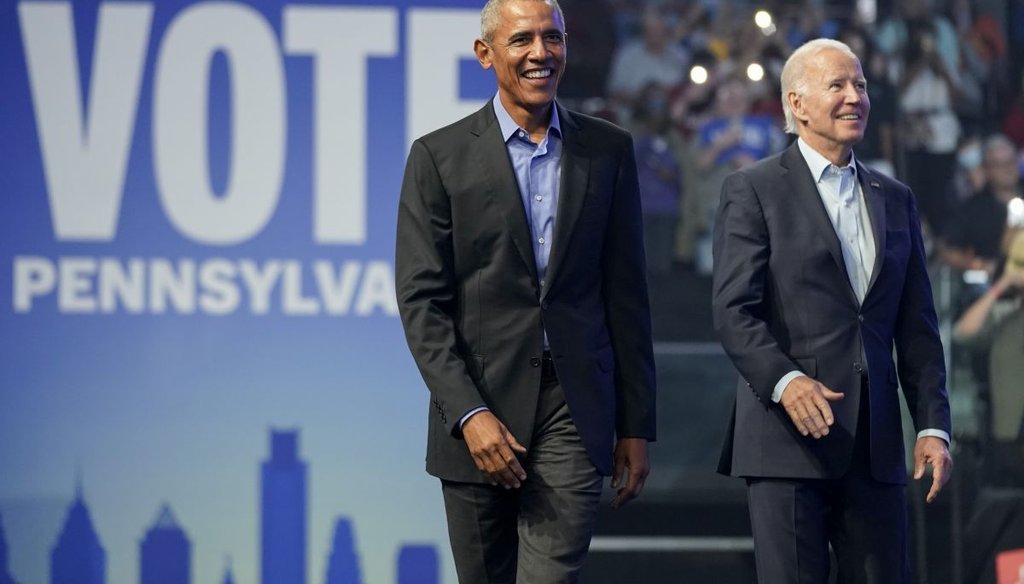Stand up for the facts!
Our only agenda is to publish the truth so you can be an informed participant in democracy.
We need your help.
I would like to contribute

President Joe Biden and former President Barack Obama at a campaign rally on Nov. 5, 2022, in Philadelphia. (AP)
Major political figures hit the campaign trail in the closing days of the 2022 midterm elections, from former presidents Barack Obama and Donald Trump to the Oval Office’s current occupant, Joe Biden.
On Nov. 5, Obama and Biden, who won the presidency and vice presidency as a ticket twice, traveled to Philadelphia to back the Democratic nominee for an open Pennsylvania Senate seat, Lt. Gov. John Fetterman, and the party’s gubernatorial nominee, Attorney General Josh Shapiro. One day later, Biden traveled to Bronxville, New York, to boost incumbent Democratic Gov. Kathy Hochul.
We fact-checked Trump’s rally in Miami, held not far from where Biden had appeared four days earlier with Florida’s Democratic candidates.
Here is a sampling of claims from Biden’s final appearances on the campaign stump, fact-checked.
This comparison is correct, but needs context.
The longer presidents serve in office, the likelier it is they will encounter an economic downturn, and the job losses during an economic downturn are what hamper presidents’ job-creation statistics.
Biden has been in office less than two years, and his strong monthly job-creation averages reflect the economic cycle when he entered office. He was inaugurated in January 2021, as the nation was recovering from the steep and sudden job losses stemming from the coronavirus pandemic’s onset in 2020. The jobs recovery began under Trump, but because he was out of office only eight months into the recovery, much of the job gains accrued during Biden’s time in the White House.
"This is literally evidence that Biden was handed something on a golden platter," Douglas Holtz-Eakin, president of the American Action Forum, a center-right think tank, told PolitiFact in October. "This recovery from a deep recession would have happened no matter who was president."
This is exaggerated.
Biden has a point that his administration has presided over smaller deficits than were seen under the Trump administration, based on Congressional Budget Office estimates. But the debt had risen because of a temporary phase of unusual federal spending, which was bound to decline regardless of who was president.
This year’s projected decline is larger than any previous one-year reduction in the deficit because of the coronavirus pandemic and the unprecedented government response.
During 2020 and 2021, the federal government’s spending skyrocketed as both the Trump and Biden administrations tried to ease the pandemic’s economic blow. The moves included enacting stimulus payments, extending unemployment insurance, instituting business operation grants and increasing public health spending.
As this spending wound down, the deficit was inevitably going to shrink.
The second caveat for Biden’s remark is that the federal debt is not lower today than it had been, but rather that it has not gone up as fast as it would have otherwise.
Since Biden was sworn in Jan. 20, 2021, the publicly held federal debt has risen about $2.6 trillion on his watch, to almost $24.3 trillion from $21.6 trillion.
Without the reduced deficits Biden referred to, the federal debt would have been higher than $24.3 trillion, probably $1.7 trillion higher, if we use CBO’s estimate.
Biden did sign a tax hike targeting very large corporations with a mandatory minimum payment of 15%.
His comparison is reasonable. For next year, a single filer with $10,276 to $41,775 in income will pay a 12% tax rate, while a single filer with $41,776 to $89,075 will pay a 22% rate, pending any offsetting deductions. Many schoolteachers or police officers will find themselves in the 22% category, though not all, depending on experience level and geography.
This is accurate.
Four Republican senators introduced the Protecting Drug Innovation Act in September. The bill would repeal the Inflation Reduction Act’s provisions that allow Medicare to negotiate lower prices with drugmakers on some medications. It would also remove a requirement for companies to pay a rebate to Medicare when a drug’s price rises faster than inflation rates and would eliminate the $2,000 cap on what Medicare recipients would have to pay for some medications.
Meanwhile, Biden also made a stop at Sarah Lawrence College in Bronxville, New York, on Nov. 6. In that speech, he addressed the plans for Social Security being articulated by congressional Republicans.
This is Mostly True.
Johnson has repeatedly said he wants to put the programs under the stricter scrutiny of discretionary spending so they remain financially solvent. Putting them up for an annual review would increase the chances they’d be cut, simply because there would be an opportunity every year to do so.
Arguably, Biden’s most inaccurate claim during his late-election swing came Nov. 1 in Hallandale Beach, Florida.
This is Pants on Fire.
Social Security recipients have received an inflation adjustment for nine of the past 10 years. The adjustments are based on a key inflation measure, as mandated by a 1972 law.
Staff Writer Yacob Reyes and Copy Chief Matthew Crowley contributed to this report.
Our Sources
Linked in article












































